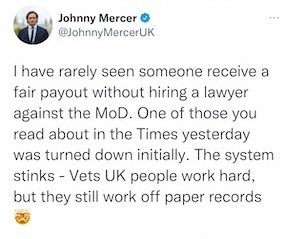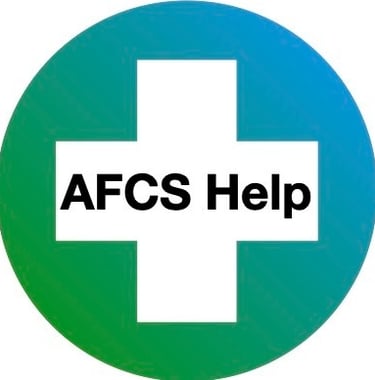
Representation
Note: This page does not contain any personal postal address or phone number.
Any such details shown in search engine results are outdated and incorrect.
AFCS Representation - Updated Content (No Personal Contact Details)
Who will administer your claim and represent you if necessary?
You? A parent? A charity? A lawyer?








The AFCS guidance on the GOV.UK website states that:
“You do not need a paid representative such as a solicitor or claims management company to apply for compensation. Free independent advice is available from the Veterans Welfare Service or other charitable organisations.”
While technically this is true, unfortunately there are a few problems with this statement, and I strongly disagree with it.
Veterans Welfare Service (VWS)
The Veterans Welfare Service (VWS) is part of Veterans UK and the MoD. The Scheme is designed to be impartial and unbiased, so there should be no reason to doubt the help from VWS. In my experience, however, I have either had bad advice or not been able to contact them at all.
The reason I can’t say for certain that I got bad advice from them is that I spoke to a number of people when I first found out about the AFCS. I thought I had never heard of the Scheme. I’ll give more detail of my own experience elsewhere on this site, but to keep to the point, I think I called Veterans UK and / or VWS and probably a charity. I was told, most likely by VWS, that my claim would be outside the 3 year time limit for claiming.
This was the first time during my AFCS application that my knowledge as a solicitor was useful, as I knew time limits for injuries weren't set in stone. I was in rag order mentally though, and so I called a charity, and was recommended to speak to a solicitor due to the complexity of my case (which isn't actually that complex when you boil it down.)
Other charitable organisations
This is one of the times I get a bit angry about how the AFCS is administered.
For MoD to have the gall to encourage people to draw on charitable resources to work out these claims, that are supposed to be done impartially by Veterans UK, makes me very annoyed.
In week 1 of my military training I was told the two roles of Her Majesty’s Armed Forces were to protect the UK’s people, territories, values and interests, and to raise money for charity.
Also, because military charities only have so much capacity to help, they can’t provide the investigative time to your claim that a lawyer could. They may have to instruct a lawyer anyway to help with complex cases. Some lawyers may do this for the charity for free, but they won’t be able to do that for everyone, and they may still come in at the last minute, rather than getting to know you and your claim throughout the process. Some people may get fantastic help from charities, but I have heard anecdotally that it can be poor. I don't blame the charities, I merely raise this so that you don't get unrealistic expectations of having Harvey Specter or James Kavanagh sweep in at tribunal knowing your case inside out.
Simply put, the GOV.UK website actively encourages you to get advice from charitable organisations. That advice is needed because Veterans UK have a reputation, based on real examples, of incompetent and erroneous claims handling and outcomes when responding to AFCS claims. Veterans UK are willingly costing charities money because they are crap at running the AFCS. That’s not OK.




Paid representatives
As I mentioned on the home page, I was a lawyer after I left the RAF. I trained to be a solicitor and despite training in Corporate Law and Family Law, I qualified into the Healthcare Law sector.
I worked for a law firm that was on the panel of firms used by the NHS Litigation Authority, which became NHS Resolution. This is the section of the NHS that deals with clinical negligence cases brought against the NHS. So I helped prepare defences to the cases that were not clear cut and needed defending, and I helped settle cases fairly where admissions of negligence were made by the NHS. In the page on this site “What is AFCS” I explained the similarities between negligence and the Scheme.
So aside from any procedures specific to the AFCS, like how to apply, I should have been about as well prepared as anyone could be to do my own application.
I still used a solicitor.
It is perfectly possible to make the claim yourself. The harder part comes when challenging Veterans UK’s first decision. The need to challenge isn’t certain, but I believe it is highly likely. I think, and hope in a way, this is due to a lack of understanding of the law by Veterans UK, and a lack of understanding of mental health conditions. Unfortunately it could be widespread fobbing off of cases in the hope of saving money. I’ll go a bit deeper into Veterans UK on another page of this site.
What the quotation I started this page with should say is:
“You
doshould not need a paid representative such as a solicitor or claims management company to apply for compensation”
The fact that a former Parliamentary Under-Secretary of State for Defence People and Veterans, Johnny Mercer, tweeted in January 2022 that he's rarely seen someone receive a fair payout without hiring a lawyer, should say everything there is to say about it.
Johnny Mercer was Minister of State (Minister for Veterans’ Affairs) at the Cabinet Office between 7 July 2022 and 6 September 2022, and between 25 October 2022 and 5 July 2024. He was also Minister for Defence People and Veterans in the Ministry of Defence and Minister for Veterans’ Affairs in the Cabinet Office from 28 July 2019 to 20 April 2021.
Veterans UK reported to him and the MoD, so he really did know how it works in practice.






(Do you 'member Twitter? Twitter used to be so good. I 'member)
An elephant in the room
I hesitate to include this, partly because it shouldn't need to be said, and partly because I worry it will put off genuine applicants.
If you're just chancing your arm with an AFCS claim, and you know you're chancing your arm, don't apply. It slows down the system for genuine claims, and it makes the genuine applicants look bad, because MoD just end up assuming everyone is a chancer, and behaving accordingly.
If you've got an injury, and you don't know if it qualifies for an AFCS claim, ask a charity with experience of AFCS, or a solicitor. By all means get a second opinion.
Mental injuries are difficult to classify and can be missed by specialists. Physical injuries can also be complicated, if there are secondary issues, or if it can be attributed to multiple causes. Think of hearing loss; it could be from helicopter noise, ship noise, IED noise, or heavy metal in headphones or frequent raving. Mental injury could be caused by seeing a friend killed by an IED, or it could be from childhood abuse. A neck injury could be from a car accident, or it could be from flying with NVGs and unsuitable equipment.
Remember also that AFCS covers injuries that are partly caused or made worse by service if service is the predominant cause of the injury or the worsening. So if you have childhood trauma which is made worse by your service, you're still eligible for an award under the AFCS (although I would bet a penny to a pound of shit you'd have to fight like hell for Veterans UK to accept that).
If you're having serious mental difficulties, you very often doubt your own credibility. If you're doing that, you're not a chancer. Let someone help you see if you have a qualifying injury. Just like the little old lady who's fractured her hip in the bathroom at home and doesn't want to trouble the GP because she knows they're busy enough already, if you're thinking you're a chancer, you probably aren't.
This is another reason to get legal advice. Lawyers are practiced at being welcoming, friendly people in order to get your business, but before you get to second base, they're going to assess you with surgical precision. If your case is fake, they're not going to get paid when it gets found out.


© 2025. All rights reserved.


